Forced into COVID-era isolation, University Medal finalists embraced resilience, compassion
The finalists relied on core values to overcome social isolation and personal adversity. Building communities was essential, they said. So, too, were resolve and humility.
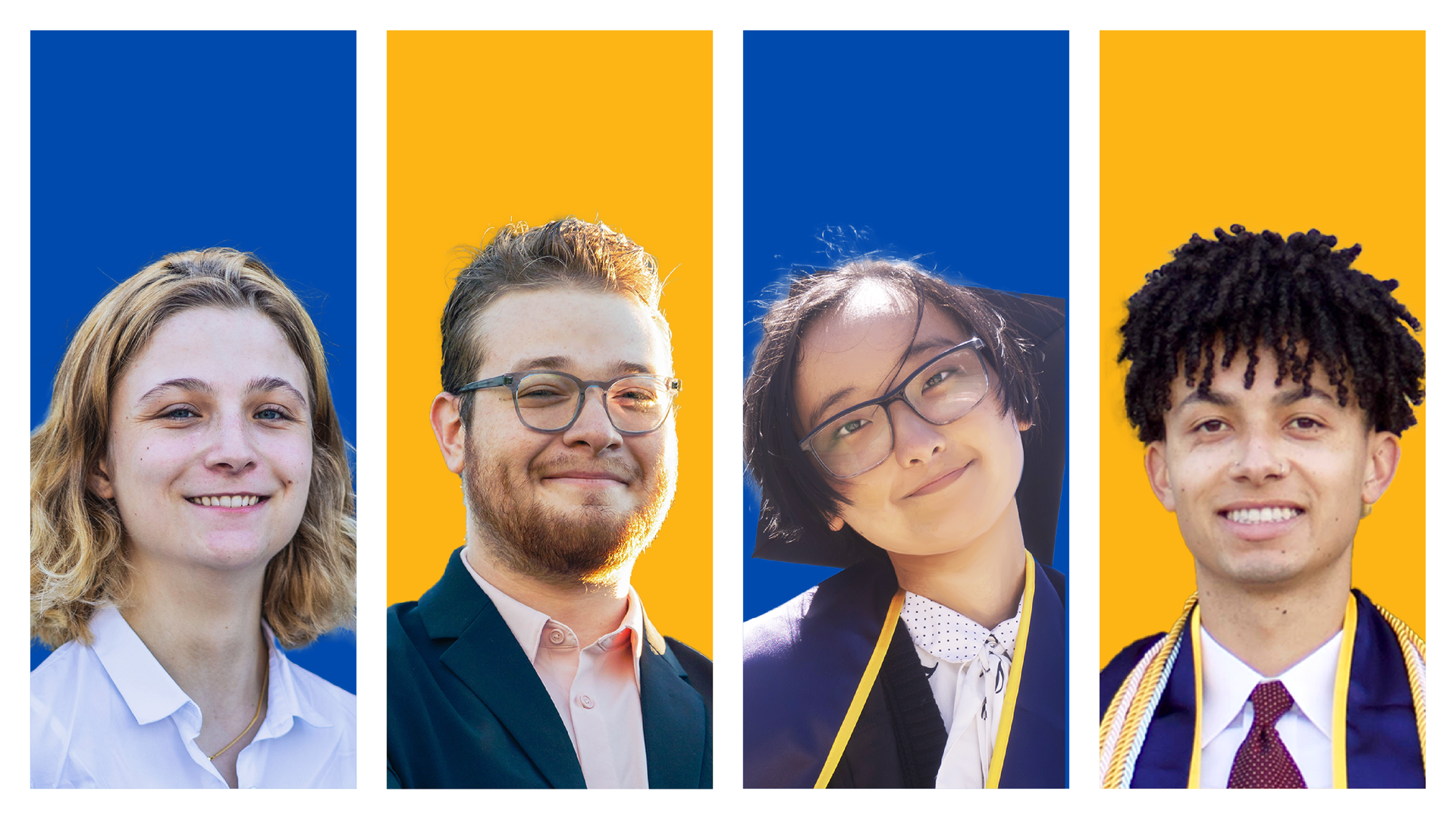
Photo credits, from left: Amy Jiang; Ricky Chen; Charles Donovan; Mistie Tran. Photo illustration by Neil Freese, UC Berkeley
May 7, 2024
In the remarkable diversity of the 2024 University Medal finalists, there is a striking theme: All of the finalists started their Berkeley studies in isolation, and through their undergraduate years, each found ways to build communities of study and service that were essential to their success.
University Medal winner Christopher Ying has lived this story, and so have the four finalists: Lilly Etzenbach, Henry F. Isselbacher, Skylar Li Song and Bryce Wallace. All of them had to endure deep personal challenges, too — difficult family lives, illness, or studying and working as a woman in a field dominated by men.
How did they manage to thrive? Adaptability, compassion, humility and community are among the values they cite to explain not just their own experience, but the character of the Class of 2024.
The University Medal was established 153 years ago, in 1871, three years after the University of California was founded. Candidates must have achieved a GPA of 3.96 or higher while overcoming significant challenges and making a positive impact on the lives of other people.
This year’s finalists:
Lilly Etzenbach
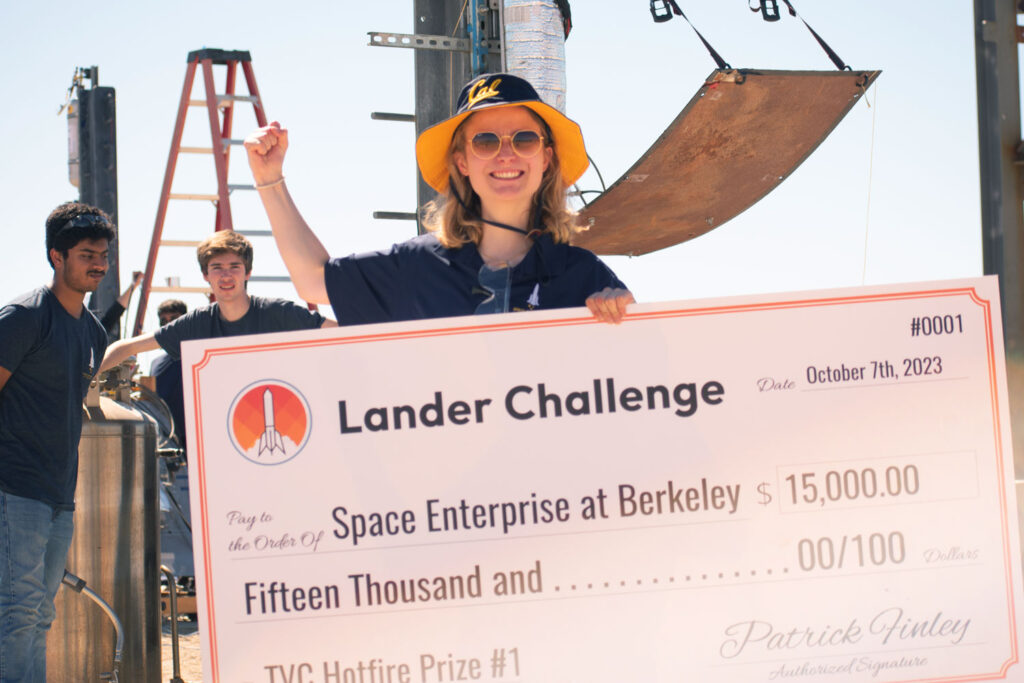
Henry Miller
Hometown: Paris, France
Major: Mechanical engineering; minor in aerospace engineering
Important extracurricular associations and activities: Space Enterprise at Berkeley, served as president and manufacturing lead. Berkeley Fire Research Lab, leading NASA research on combustion in microgravity. Cal Judo and Air Bears.
What’s next? Graduate studies at MIT in astronautics, focusing on the development of optimized space systems to explore the universe.
What has been the biggest challenge you faced at Berkeley? How did you address it?
“As a freshman, I struggled to find my ground in the aerospace industry. One particular encounter with a female project manager stands out: Her advice to ‘toughen up’ in order to carve out my space left me questioning my place in the field. However, at Cal, I found amazing women to look up to and to learn from, from professors to peers. Throughout clubs and classes, we forged a community for underrepresented genders in the field.”
If you could relive your UC Berkeley experience, what one thing would you do differently?
“When prompted about the biggest challenges at Cal by prospective or incoming students, my answer is always the same: finding and balancing the time to explore and take advantage of all the amazing opportunities this school has to offer. Looking back, I wish I had approached this pursuit with less apprehension — the explorative and uncertain nature of the process is what ultimately renders it exciting!”
Thinking ahead 10 years, how do you think that the challenges that your class has faced will shape you as a group, as a generation?
“From high school graduation ceremonies in drive-throughs to lockdown lunch boxes from Crossroads Dining and Zoom-proctored exams, the challenges we faced as a generation taught us to adapt to a rapidly changing environment and to care for each other in the process, whether nearby or on the other side of the globe.”
Humanity seems to be in such a state of stress right now, and our needs and challenges on Earth are so great. Why is it important that we look outward to the planets and the stars?
“Not only does space allow us to connect to each other through our phones and to collect crucial data on humanity’s impact on the planet, it is a true catalyst for international cooperation and for technological innovation. Beyond these tangible appeals, the stars sailing over our head provide a constant source of inspiration and humility to draw courage when navigating the Unknown and to embrace the infinite possibilities that lie beyond.”
Henry F. Isselbacher (he/him)
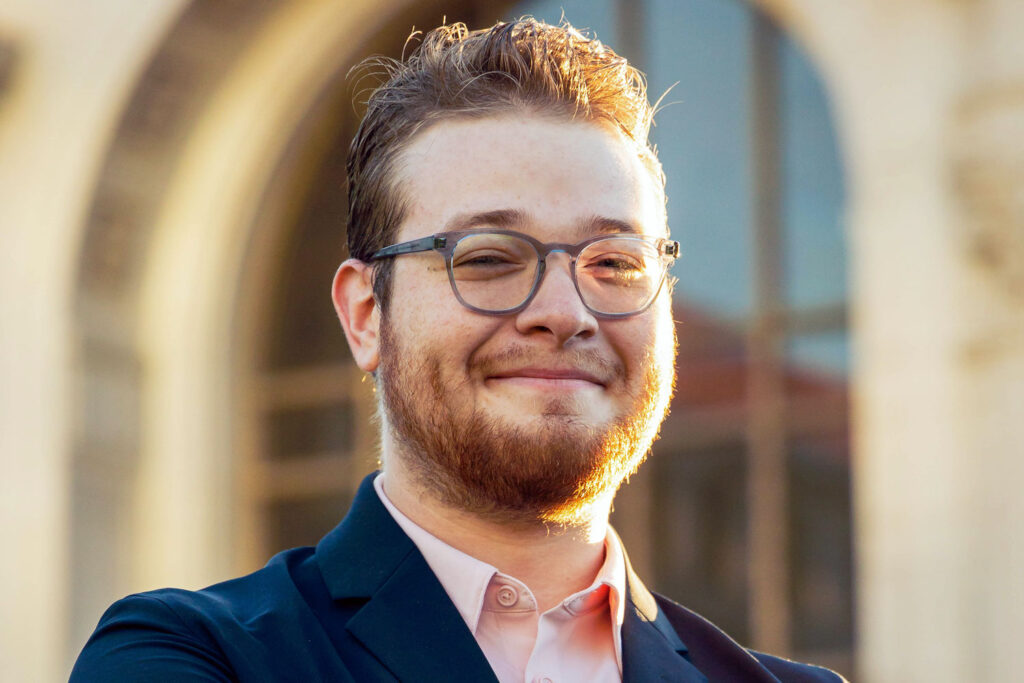
Ricky Chen
Hometown: Newton, Mass.
Majors: Economics, public health; minor in public policy
Important extracurricular associations and activities: Chief financial officer, Associated Students of the University of California (ASUC);chair, ASUC Student Union Board of Directors; executive director, ASUC Grant & Scholarship Foundation; president, Sigma Alpha Nu pre-law fraternity; undergraduate student instructor, economics & statistics
What’s next? A year off to work and absorb everything from my time at Berkeley and then after that, law school.
What has been the biggest challenge you faced at Berkeley? How did you address it?
“The biggest challenge was finding a sense of community and belonging during my first year in 2020, when everything was on Zoom. I was home on the East Coast for most of that year, and I remember the disconnect that I felt. I addressed that challenge by seeking community through my extracurriculars and trying to find creative ways to connect with new friends from afar. This underscored the importance of getting involved around campus outside of academics.”
If you could relive your UC Berkeley experience, what one thing would you do differently?
“Funnily enough, I taught a DeCal during my second year, but I never took one as a student, and so I think I would want to enroll in a DeCal. Part of the college experience should absolutely include the exploration of new interests and topics that fall outside traditional curricula and pedagogy, and the DeCal program brings together students from all over campus to just have some fun learning without any stress or pressure.”
Thinking ahead 10 years, how do you think that the challenges that your class has faced will shape you as a group, as a generation?
“Our generation has adapted in the face of unfamiliar and uncertain circumstances at such a dynamic moment in our lives. I think this has given our cohort the resolve to tackle whatever challenges that lay ahead and an optimism that even when the chips are down, there’s nothing we can’t handle.”
In your University Medal essay, you noted the need for humility. Tell us more — why is humility important?
“One of the traits of Berkeley is ‘excellence,’ and most folks — students or faculty — arrive at Berkeley given their excellence in something or another. But no matter how ‘excellent’ any one person is, meaningful accomplishments and achievements cannot often be realized by oneself. Humility shows us that there is strength in numbers, that more approaches are better than fewer, and that our excellence and skills are relative rather than absolute.”
Skylar Li Song (they/any)
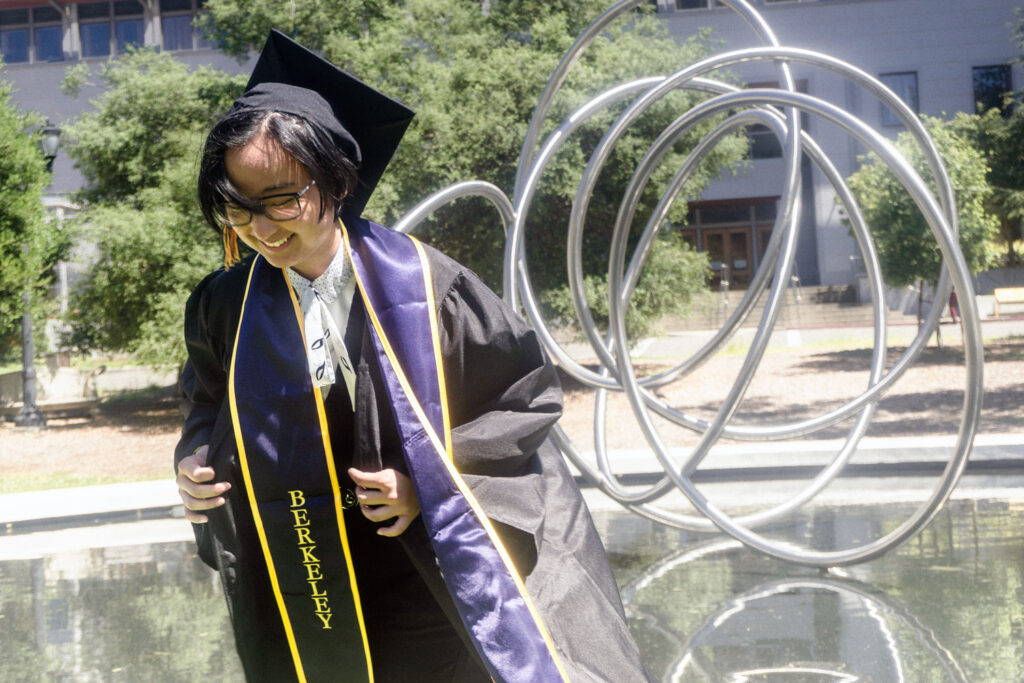
Charles Donovan
Hometown: Shandong, China
Major: Art practice; minor in creative writing
Important extracurricular associations and activities: Founder, president, and head mentor for Digital Illustration and Concept Art at Berkeley (a registered club); facilitator for Introduction to Digital Painting (DeCal); game art mentor and graphic designer for the Game Design and Development Club at Berkeley; Konshuu publication artist and panelist for Cal Animage Alpha and Anime Destiny; guest mentor/volunteer artist and designer for various registered student organizations
What’s next? A medically necessary break while continuing work as a freelance artist, volunteering, and developing my artistic and creative writing practice/passion projects. Then, grad school! Far future — becoming a professor.
What has been the biggest challenge you faced at Berkeley? How did you address it?
“Coming out of years of medical trauma, the cultural limbo of being a first-generation immigrant and college student, and the pain/violence of my childhood, my biggest challenge has been rebuilding my fractured identity. In grappling with a relentlessly uncertain present and future, I learned to rebuild my crumbled agency back up to help others on their creative journeys, to build community and hopefully inspire positive change for those around.”
If you could relive your UC Berkeley experience, what one thing would you do differently?
“I would have taken more time to venture outside of my comfort zone. In negotiating rebuilding my own identity emerging from past traumas, the debilitating fear of messing up often meant that I gravitated towards my strengths academically and artistically. I would have pushed myself more to break free of that fear, to experiment artistically in brand new mediums, and examine academic topics radically outside of my own familiar purview.”
Is there some element of character or experience that sets the Class of 2024 apart? How will that shape your class going forward?
“From the uncertain pandemic years to the still uncertain present, we’ve shown our ability to be resilient in turbulent times, in spite of our personal challenges. Even in small ways, we can do our best to use our strength and resilience to work towards a better, more compassionate world.”
Your health challenges have been significant, and the world generally seems to be in such a difficult, turbulent period. In such a context, why is art important?
“Art, to me, is more than escapism. It’s a mortar that fills the fault lines of our brick so that when everything breaks, it holds us. It may tether our multitudes of suffering and joy, pain and catharsis — distilled. Stylized. Mystified. But this miraculous mortar cannot be found. Our cracks, they’re too deep and stubborn; too at once agonizingly familiar and devastatingly particular. So we make our mortar; we make this mortar and mend ourselves.”
Bryce Wallace
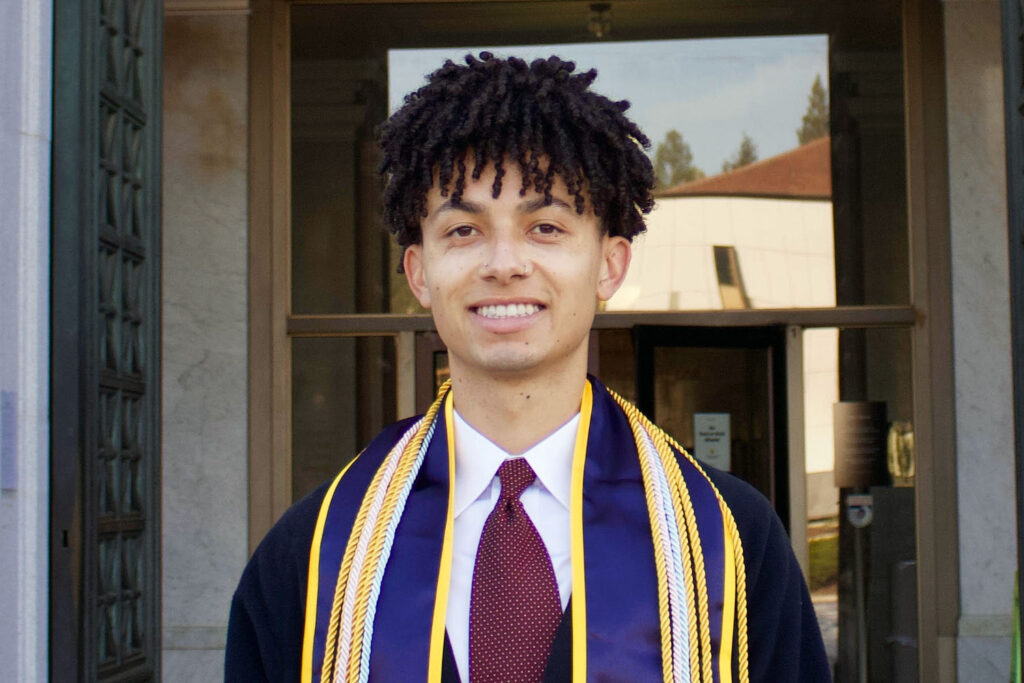
Mistie Tran
Hometown: Southern California
Majors: English, linguistics
Important extracurricular associations and activities: College Corps Volunteer Fellow at McClymonds High School in Oakland; volunteer at Akira’s Book Club; treasurer of the English Undergraduate Association.
What’s next? Ph.D. in English at Yale University
What has been the biggest challenge you faced at Berkeley? How did you address it?
“When I reflect on who I was before my time at Berkeley, I am reminded of how unlikely this all would seem to my previous self. I arrived as a transfer student with a lot of self-doubt and had to slowly learn to trust my intuition and be proud of my ideas. I am here now because of my mentors, who helped me see in myself what I for so long could not.”
If you could relive your UC Berkeley experience, what one thing would you do differently?
“I would have made more time to sit on the stairs under the Campanile and watch the sunset. But I would rather consider this as a reminder for the future than a regret.”
Is there some element of character or experience that sets the Class of 2024 apart? How will that shape your class going forward?
“Berkeley is brimming with passionate students of varying backgrounds and perspectives; reducing the complex experiences of such a diverse student body to a singular narrative would be a misstep on my part, especially because Berkeley students, historically and at this very moment, do not struggle to speak for themselves.”
In a general sense, what does it mean to be a good citizen? Why do you see this as an important value?
“Considering this abstractly, as an answer to a question rather than a performed action, I’d say good citizens are patient, avoid cynicism and hypocrisy, and fearlessly dream for a better world, yet are cautious when attempting to actualize these dreams. However, the world doesn’t always lend itself to the abstractions we use to define it, and though I generally argue for humility and agreeableness, there are clearly times when good citizens must be anything but.”